Orla GuerinSenior International Correspondent in Syria

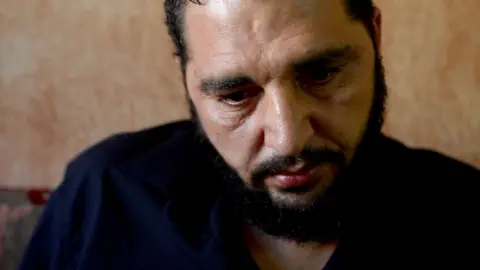 BBC/Goktay Koraltan
BBC/Goktay Koraltan
Adnan Al Ezzeldin says people are being killed for being Alawites
The killer came by night – a masked man on a motorbike who struck without warning and then sped away. It's become a familiar pattern in some corners of the new Syria in recent months, as the country's fragile unity is eroded by revenge attacks and sectarian killings.
The main targets are Alawites, the sect of the ousted Syrian President, Bashar al-Assad. But this time, on 1 October, the victims were Christians – Wissam and Shafiq Mansour, cousins who were both 39, and were as close as brothers. As they chatted with a friend over coffee and cigarettes, they were hit by a hail of bullets.
The killings happened in the village of Anaz in Wadi al-Nasara, or the Valley of the Christians – an area of rolling hills in rural Homs province in western Syria. Locals say the gunman came from the direction of a nearby Sunni Muslim village.
Sitting a short distance from Wissam's coffin, his father George, railed against the authorities, saying Christians in the valley had been left defenceless.

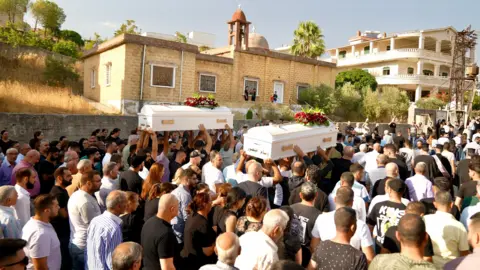 BBC/Goktay Koraltan
BBC/Goktay Koraltan
Cousins Wissam and Shafiq Mansour, both Christians, were shot dead by a masked man on a motorbike
"Guns were taken from us but left in the hands of a rival (Sunni) village," he said. "We want to carry arms against them. They don't know anything about religion or love or peace. Today it's Wissam, tomorrow it could be anyone."
Many in the valley are feeling vulnerable these days. Before the regime fell, they backed Assad, and he backed them. Many Christian communities looked to him for protection. Wissam was part of a pro-Assad militia, defending his village. Some locals say that's why he was targeted.

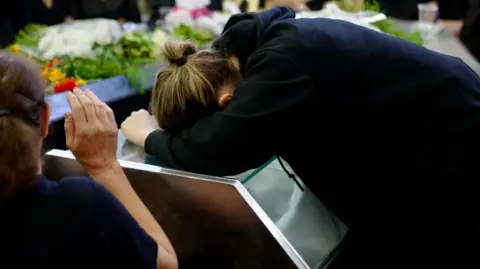 BBC/Goktay Koraltan
BBC/Goktay Koraltan
Wissam's wife Leen says goodbye to him at his funeral
Was it a revenge attack, or a sectarian killing? We can't be sure, but nothing will bring Wissam back to his wife Leen. She bent over his coffin for a last goodbye, then slumped back, ashen-faced.
Her husband and his cousin were taken for burial – their white coffins carried by black-clad mourners through streets brimming with grief. The crowd chanted "Christian blood is precious" as they passed the scene of the attack.
The community here is bound together by faith, and by fear that Syria's new Islamist leadership – which overthrew Assad in December last year - may not protect them.
The lone survivor of the attack doesn't intend to wait to find out. He was shot in the hand and broke his ankle making his getaway. He doesn't want to be named.

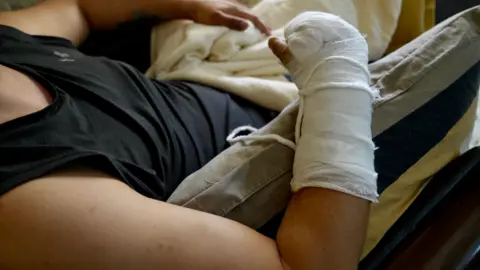 BBC/Goktay Koraltan
BBC/Goktay Koraltan
The sole survivor of the attack - who doesn't want to be identified - now says he will leave the country
After the fall of the regime, the 36-year-old had come back to Syria, from Lebanon, with high hopes.
"We all came back home," he said, "wanting to start new businesses. But what we were promised about security, and a future for Syria, we do not see it. My dearest friends are dead. I will have to leave the country again. There are many extremist groups. I don't know where Syria is going."
Less than an hour's drive away, in the city of Homs, there are almost daily reports of kidnappings and drive by shootings. We found a pattern of deadly attacks on Alawites, killings that happen quietly, and attract little response.
The city has plenty of battle scars; some of its bustling streets are lined with ruins and rubble. Having survived the war, some Alawites now wonder if they will survive the peace.

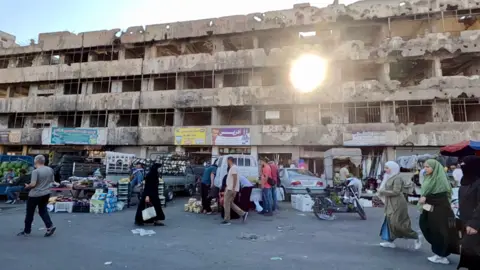 BBC/Goktay Koraltan
BBC/Goktay Koraltan
There are almost daily reports of kidnappings and drive-by shootings in Homs
During the Assad era, belonging to this sect – an offshoot of Shia Islam - could bring benefits.
Now it's a curse, and for Shaaban Al Ezzeldin, 46, it was a death sentence.
The shopkeeper was shot three times on 28 September as he locked up the family business at night. Once again, the killer was a masked man, on a motorbike.
We meet his brother Adnan in a building owned by their family since 1970. He is bearded, wearing black, and weighed down by grief. Unlike many, he dares to speak out.
"People are being killed just because they are Alawites," he told me, "no more, no less. My brother was loved by everyone in the area, by all our neighbours, by all sects. Some of our neighbours used to come to the shop and enjoy evenings with him. He never bothered or harmed anyone."
He says Shaaban used to sit and chat with security forces at a checkpoint right outside the shop. After the checkpoint was removed, he was shot dead.
I asked why he thinks the checkpoint was taken away. He says he does not know and stresses the family are "not accusing anyone".

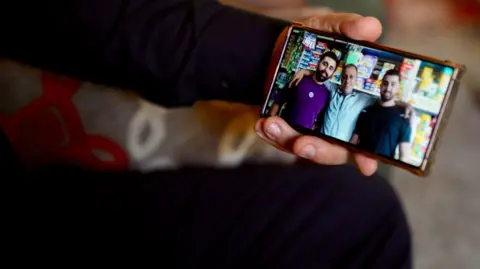 BBC/Goktay Koraltan
BBC/Goktay Koraltan
Shaaban (centre) with two of his sons in the family's shop
Adnan says two other Alawites were killed on the same day as his brother, adding that the bloodletting has a purpose. "What's happening right now is the seed for forced emigration," he says. "It's just the beginning. Someone is trying to destabilise the situation, and oppose co-existence, though we have been living together for hundreds of years."
He hopes Syria's mosaic of religions and sects can hold together. But then he adds: "I lost my brother, and others lost their loved ones too. If we are all going to get killed, it's better we flee."
Syria's interim government has promised to protect all its citizens, not just the majority population of Sunni Muslims. The country's Justice Minister, Mazhar al-Wais, says there will be public trials for those accused of involvement in large scale sectarian violence earlier this year.
More than 1,400 people were killed in March when government forces and allied groups were accused of carrying out summary executions, after an attack by Assad loyalists. Most of the victims were Alawite civilians.
About 2,000 people - combatants and civilians — were killed in July in another outbreak of sectarian violence. Here too government forces were accused of executions. Most of the dead were from the Druze minority.
The scale of the recent killings is hard to assess. The attacks are usually isolated and often shrouded in silence. Many families are afraid to talk.
By cross checking information from local media reports, contacts on the ground and human rights groups, we estimate that at least 40 Alawites were killed in Homs in separate attacks between 5 June and 31 October. The dead included a student, a farmer, a taxi driver, a teacher killed in a grenade attack on a school bus, and another shot dead in front of her class.
The Syrian Network for Human Rights (SNHR) says there are escalating incidents of murder and kidnapping in Homs province, with Alawite-majority areas the most affected. Most attacks are acts of revenge, it says, against former members of the regime, or those suspected of collaborating.
Alawites account for about 10% of Syria's population, but under Assad – the father and the son – they filled many roles in the military, security and intelligence agencies.
Whether they supported the regime or not - and not all of them did – Alawites are now at risk.

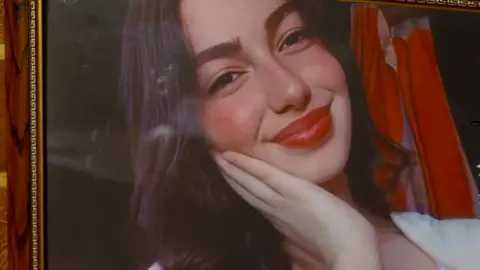
Ghina was shot dead while standing on her balcony in Homs
In a modest home in a mixed neighbourhood of Homs, a pink-walled bedroom has become a shrine. A copy of the Quran rests on a pillow. School books and letters from friends are piled on a desk. This is where a mother – who does not want to be named - comes to be close to her beloved daughter. "Her soul is still hanging over the place," she says. "Her friends come every few days. No one fully grasps the idea that she is now dead."
Ghina, 14, was on the balcony of her home on 19 August when a gunman on a motorbike drove past and opened fire. She died in her mother's arms, surrounded by neighbours who had come to celebrate her exam results.
Ghina was "the best of daughters" her mother says, "so smart, so good at school, addicted to studying, with so many plans." The teenager loved basketball, and wanted to travel and to study law.

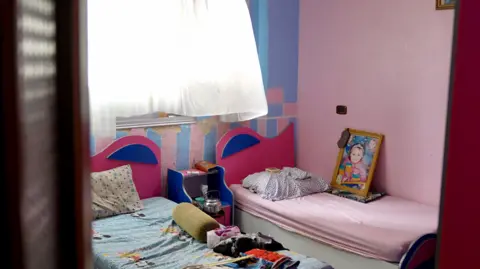 BBC/Goktay Koraltan
BBC/Goktay Koraltan
14-year-old Ghina's bedroom has become a shrine since she was killed
Her younger brothers no longer go to school. Their mother is too frightened to let them.
"Alawite families started leaving the area, they sell their houses and go. We thought it would get better (after the fall of Assad). They said it was liberation; people would live freely. Now we fear everything. We are scared when we hear a motorbike."
Ghina's face stares out from a large photo, her warm smile framed by long dark hair. "She was smiling since the day she was born," her mother says. "She loved life so much."
Her mother does not speculate on who killed her. "There are harmful people around," she says, "they sow seeds of sedition. Probably they are not connected with the authorities or the state. I really don't know."
But she is sure of one thing – why her family was targeted. Was it because you are Alawite, I ask?
"Yes", she replies, without hesitation.
On the same day we met Ghina's mother, another Alawite family were burying a loved one who had been abducted and killed. When we visited their home, they received us politely but were too frightened to speak.
No one has been charged with Ghina's killing. The killings in the Valley of the Christians are also unsolved.
Additional reporting by Lana Antaki, Wietske Burema, Goktay Koraltan and Aref Alkrez.
More reports from Orla Guerin in the new Syria
.png)
 3 hours ago
1
3 hours ago
1

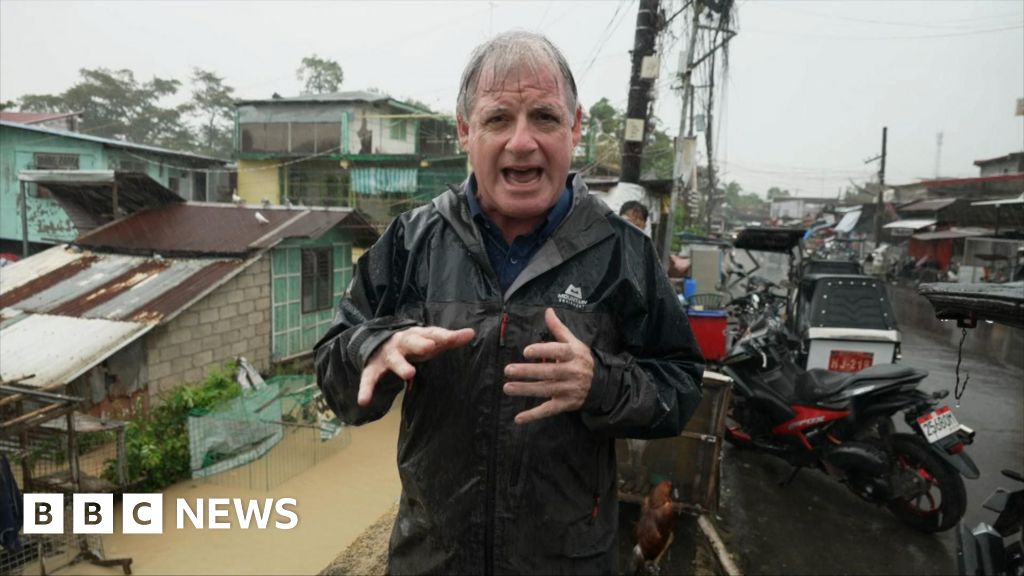






 English (US) ·
English (US) ·